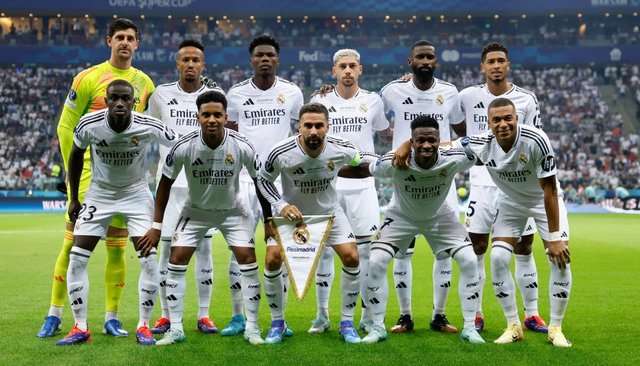
A Short History of Real Madrid
Early Years (1902–1930s):
Real Madrid was founded on March 6, 1902, by a group of football enthusiasts led by Juan Padrós and Julián Palacios. Originally named Madrid Football Club, the team quickly grew in popularity. In 1920, King Alfonso XIII granted the club the title "Real" (Royal), making it Real Madrid. During the early years, the club won several regional championships, establishing itself as a competitive force in Spanish football.
Golden Era (1950s):
Real Madrid's dominance on the international stage began in the 1950s. Under the presidency of Santiago Bernabéu, the club built a strong foundation for future success. Key acquisitions, including Alfredo Di Stéfano, Ferenc Puskás, and Francisco Gento, turned Real Madrid into a powerhouse. The team won the inaugural European Cup in 1956 and went on to win the first five editions of the tournament (1956–1960), a record that remains unmatched. This period also saw the development of the iconic Santiago Bernabéu Stadium, which became the club's home.
Transition Period (1960s–1970s):
The 1960s were marked by continued success domestically and in Europe, including another European Cup in 1966. However, the following decade saw a gradual decline in European dominance, even though the club remained competitive in Spanish competitions. The team underwent a generational change, with players like Gento retiring and new stars emerging.
Revival and "La Quinta del Buitre" (1980s):
The 1980s brought a resurgence, largely thanks to "La Quinta del Buitre" (The Vulture’s Cohort), a group of homegrown players led by Emilio Butragueño. Alongside players like Michel, Hugo Sánchez, and Martín Vázquez, Real Madrid dominated Spanish football, winning five consecutive La Liga titles (1986–1990). However, European glory eluded them during this era.
Galácticos Era (2000s):
In the early 2000s, under the presidency of Florentino Pérez, Real Madrid pursued the "Galácticos" policy of signing world-class stars. Players like Zinedine Zidane, Luís Figo, Ronaldo Nazário, and David Beckham joined the club, making it a global brand. The team won the UEFA Champions League in 2000 and 2002, with Zidane's stunning volley in the 2002 final becoming one of football's most iconic moments.
Modern Era and Champions League Dominance (2010s–2020s):
The modern era has been defined by unparalleled success in the UEFA Champions League. Under managers like José Mourinho, Carlo Ancelotti, and Zinedine Zidane, Real Madrid built a squad featuring Cristiano Ronaldo, Luka Modrić, Sergio Ramos, and Karim Benzema. The club won four Champions League titles in five years (2014, 2016, 2017, and 2018), cementing its status as the most successful European team. In 2022, Real Madrid added another Champions League title under Carlo Ancelotti, bringing their total to 14.
Cultural and Global Impact:
Real Madrid has transcended football, becoming a symbol of excellence and prestige. The club is deeply rooted in Spanish culture and has a massive international following. Its rivalry with FC Barcelona, known as "El Clásico," is one of the most anticipated and intense fixtures in world football. Off the pitch, the club is also a leader in commercial and technological innovation, consistently ranking among the most valuable sports teams globally.
Downvoting a post can decrease pending rewards and make it less visible. Common reasons:
Submit